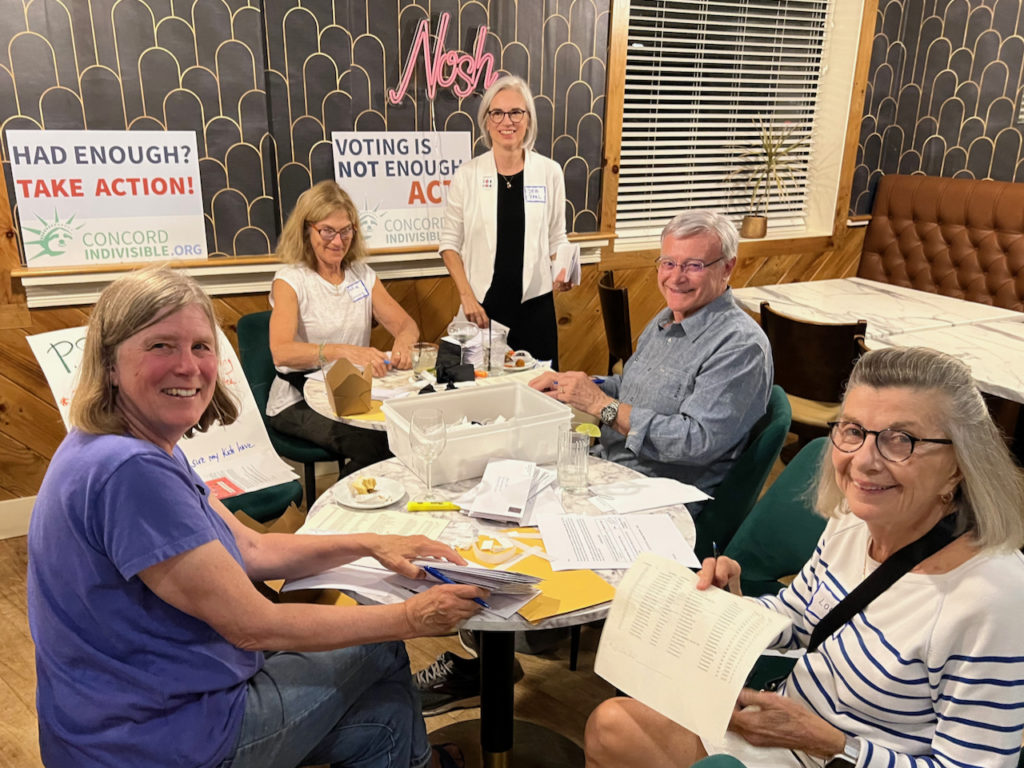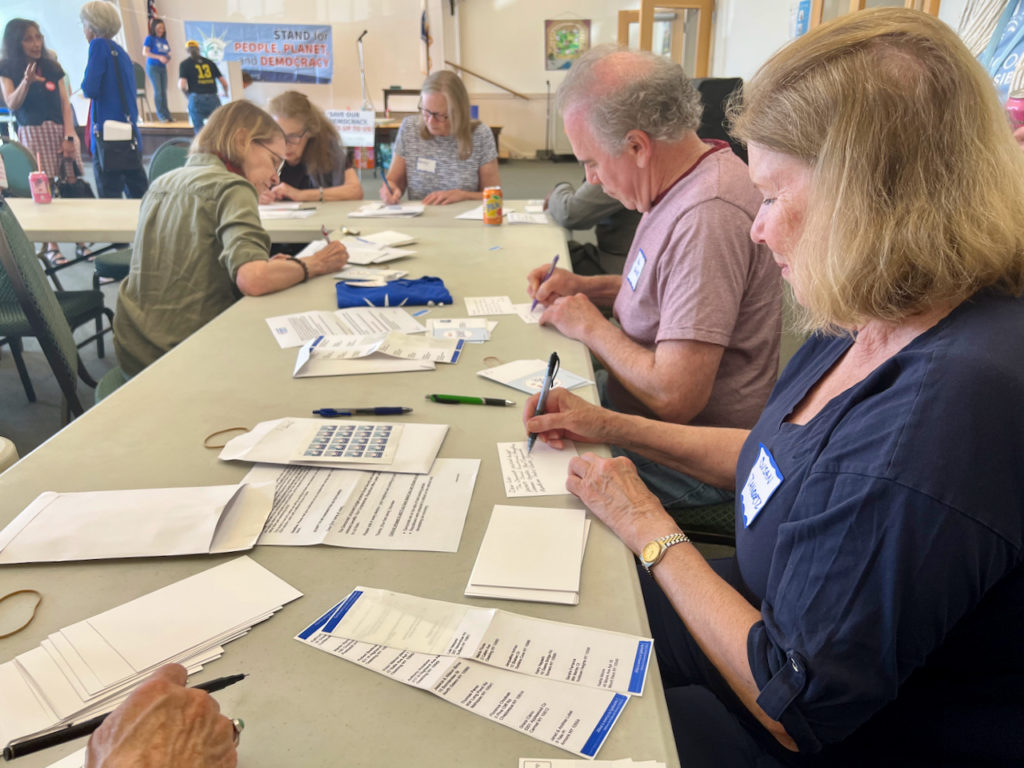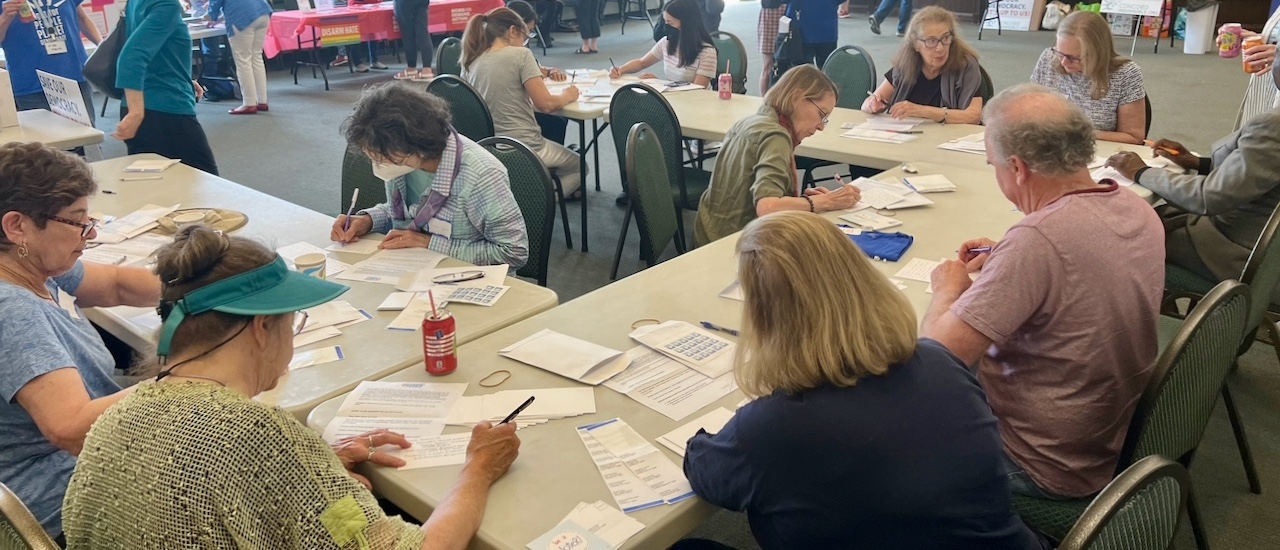by Anita Saville

I recently told a family member about my mission to engage all the people I know in this year’s election.
“But what can we do in Massachusetts,” he asked, “where we know the Democrats will win?”
Here was a well-informed contemporary who had no idea that there are dozens of ways each of us can help turn out the vote in other states. Those of you who faithfully read our newsletter know this. But we clearly must get this message to others.
Every contact with voters counts.
Some — perhaps you are one — may also wonder whether sending a packet of 20 postcards, for example, does much good. We need only go back to last November, when voters — encouraged by an avalanche of postcards, letters, phone calls, texts, and canvassing — rallied again for Democrats who support reproductive rights to create a blue tidal wave. Dems even won in the very red state of Kentucky, offering hope that a MAGA landslide is not inevitable in 2024.

Concord Indivisible was fully engaged in that effort — sending 5,000 postcards to voters in Ohio. We also sent 2,000 postcards to Wisconsin earlier in the year to help pro-choice judge Janet Protasiewicz win a seat on the state supreme court. It was an extraordinary burst of energy by progressive groups for an off-year election. But these are extraordinary times, when critical elections are often won by a small margin of votes.
At four to five minutes each, it takes about an hour and a half to write, address, and stamp 20 postcards. (Maybe a little longer, if you’re chatting with fellow postcarders.) The cards, written by hand, send a personal message that someone cares whether a fellow citizen registers to vote, knows where and when to vote, and understands what’s at stake in this election.

In a recent, locally-sponsored zoom conversation, the nationally renowned David Pepper (author of Laboratories of Democracy and Saving Democracy) said that postcarding is the most effective resource that out-of-state activists can offer. Research shows that postcards are particularly impactful when they target those who do not vote frequently and when they have a specific call to action (such as requesting a mail-in ballot). These are the types of projects that Concord Indivisible recommends.
Twenty postcards. Ninety minutes. It’s a small price for our continued freedom — including the freedom to vote.
Small actions add up.
Our actions, however small individually, add up when multiplied across the country. This is our super power as activists. Now, as in 2020 and 2022, it will take all hands on deck to keep an autocrat out of the presidency, hold the Senate, flip the House, and prevent more Republican supermajorities in state legislatures. Feeling more adventurous? You might spend those 90 minutes making phone calls or sending text messages. We need all types of communication to connect meaningfully with voters.
As we move forward in 2024, you can lend a hand in two ways.
First, take the next step as an activist. If you largely go to rallies, consider donating to a candidate or election-focused organization. Donors: consider writing postcards and letters. Writers: consider making phone calls or sending texts. Callers and texters: consider door-to-door canvassing.

You may be surprised how rewarding these new adventures can be. You can do most of these actions from home — though it’s a lot of fun to do them with kindred spirits. Concord Indivisible and our allies will provide all the training and support you need. (We also now offer discounted postcard packages.)
Second, urge like-minded friends and family to join you, subscribe to our newsletter, or find a local Indivisible group near them.
If you’ve ever thought, “I’ll do more at some point,” that time is now.
Twenty postcards. Ninety minutes. How did you defend democracy today?
Anita Saville is a member of Concord Indivisible’s Steering Committee.


Leave a Reply